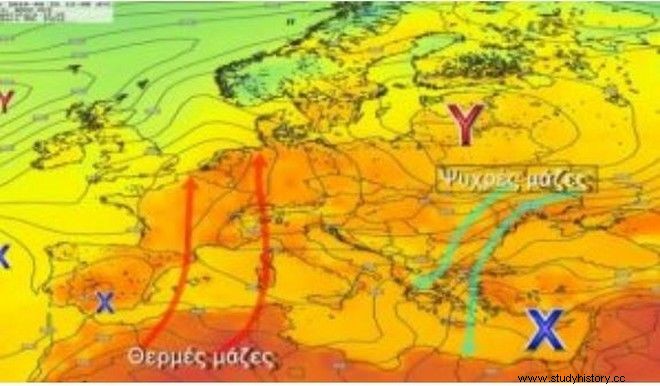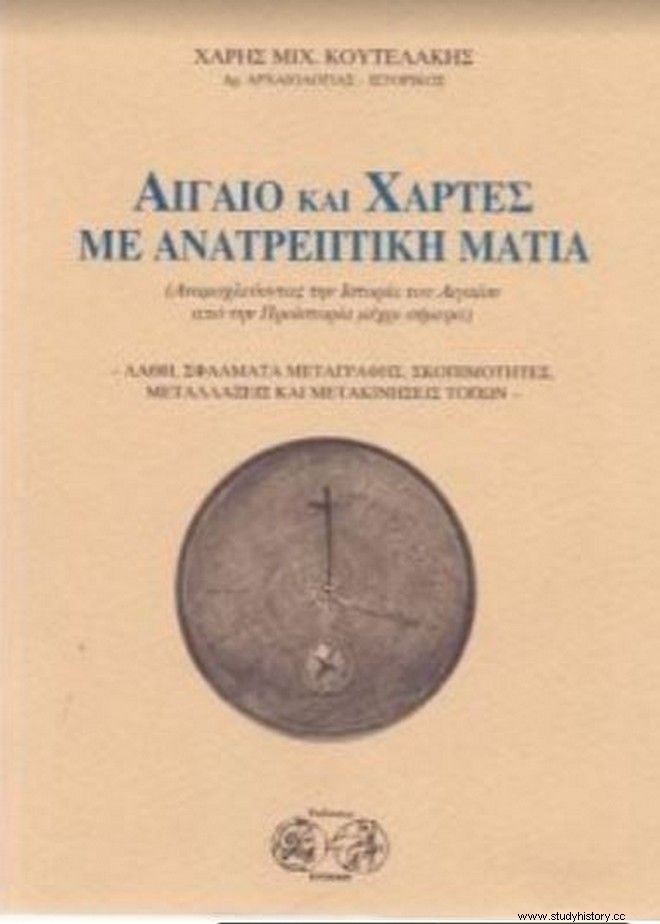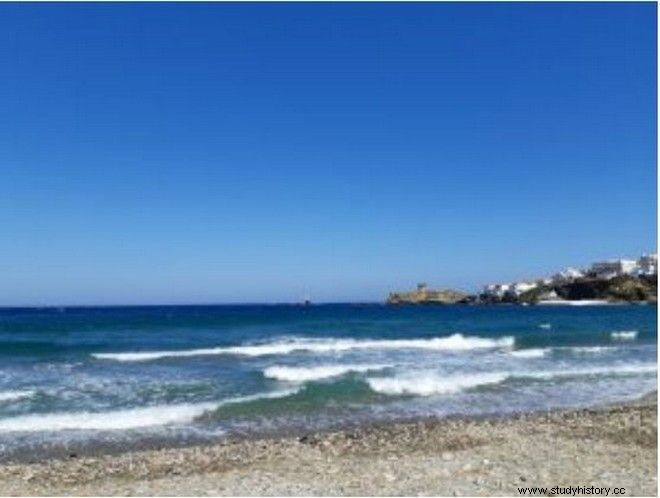The well-known and beneficial meltemias have their own linguistic history over the centuries. Is the origin of the word meltemi Turkish or French?

Every summer, usually towards the end of June, Western Europe begins to be "baked" by an intense heat wave, while on the contrary in South-Eastern Europe, things are usually different. If, in particular, a high pressure field is established in the northern Balkans or a little further north in Eastern Europe, then in our country the system begins to combine with the lows of the Eastern Mediterranean and strong northerlies are caused in the Aegean that transport colder air masses. We all know that the meltemi is the annual summer local daily wind that manifests itself in the Greek seas and mainly in the Aegean with the direction of the winds in the northern Aegean in the NE, in the central Aegean in the N and NE, in the southern Aegean and Cretan Sea NW., reaching up to western addresses mainly in Rhodes.
THE FIRST HISTORICAL REPORTS ON THE MELTEMI
The first recorded reference to the annual winds is found in written monuments dating back to around 700 BC. Then Aristotle names "yearly winds", that is, winds that blow every year, the winds that blow in the Aegean during the summer and have mainly a northerly direction. Also similar information is given by Theon of Alexandreus (about -335, – 405).
According to Aristotle, these winds blow after the summer solstice, which is on June 21, and the sunrise of the constellation of "Canis" which rises on July 25 and has the well-known Sirius as its brightest star. According to Eudoxus (404 – 335 BC), a great ancient Greek mathematician, the annual winds blow from July 24th to August 31st. These reports are the first recorded observations of the phenomenon, which over the centuries has changed its name and is now described as meltemi
BEHIND THE HISTORY AND LITERATURE IS THE MYTH - HOW AND WHY JUPITER BRINGED MELTEMIA
As you know the word "fire" is ancient, although not from the classical era but Hellenistic. In classical antiquity, they did not say "burning", they said "burning" and meant that period when Sirius rose together with the Sun. Cicero and Virgil associate Sirius with the summer heat, and consider him to be the cause of rabies in dogs. Sirius is considered responsible for the so-called "cynic burns", i.e. the burns caused by the Sun to those recklessly exposed to its rays.
In ancient times, the time period after July 21st was also referred to as the "Cynic Days" Today, the official starting days for the "Cynic Heat" for the Northern Hemisphere are from July 3rd and last until about mid-August. This particular period of summer is described in the ancient sources in quite "black colors" and almost all writers agree that the East of Sirius brings with it misfortune, disease, hardship, misery and high fever to people. Characteristically, the poet Alcaeus writes:""Cool your lungs with wine, for the star of Canis, Sirius is coming around. The season is hard and all are thirsty under the heat and the cicada sings sweetly under the leaves...the women then are quite meek and the men weak, while Sirius nibbles on their heads and their knees"

In the works of authors such as Apollonius, Diodorus Siculus and others, the simultaneous rising of the Sun and Sirius in this period is mentioned as well as the corresponding phenomena. Specifically, they describe that when Sirius approached the Cyclades in orbit, he burned them in the form of the Cynic Fires, with the result that the springs dried up, no cool wind blew at all and epidemic diseases were caused. So, the inhabitants of the Cyclades asked the help of the god Apollo and his oracle at Delphi to provide a solution to their problem. Apollo gave them an oracle to summon the hero/god from Thessaly Aristaeus.

Aristaeus was the son of Apollo and Cyrene. His upbringing among the Centaurs, Muses and Nymphs provided him with a wealth of knowledge. He learned from them the arts of medicine, divination, vine and olive cultivation, beekeeping, etc. Everything he learned Aristaeus decided to share with the people and in several regions of the ancient world he was worshiped as an agricultural deity. Aristaeus, therefore, was instructed by his father Apollo to leave Phthia (the capital of the kingdom of the Myrmidons in Thessaly) and settle in Kea. He was followed together by the tribe of the Parasians who were descendants of Lycaon from Arcadia. When he arrived at Kea on the mountains of the island he built an altar in honor of Icmaeus Zeus (the Zeus of rain-moisture) and sacrificed to him and Sirius, as Theophrastus mentions in his work On the Winds.
Then Zeus sent the annual winds or otherwise our familiar meltemias which blew for forty days. These very beneficial and savior winds for the Cyclades saved the inhabitants of the islands and helped in every aspect of their lives. From then on, the sources state, the inhabitants of Kea, in order to "pacify" Sirius, began to observe and calculate in advance the rising of the star and how hot it would be the following summer. All this with the help of Aristaeus.
FROM THE ANCIENT ANNUAL WIND, TO THE MODERN MELTEMI - ITS ETYMOLOGY
The ancient Greeks called the northern summer wind Etisios (pl. Etisiai), a name used by many peoples, while during Byzantine times these winds were referred to as riktai (Lehoux, 471). The majority of the world and also the electronic libraries report that the name meltemi is of Turkish origin. Let's see below if this point of view is really true or if the word meltemi is...of French origin!
The archaeologist-historian Haris Koutelakis in his book "Aegean and Maps with a Subversive View" - Athens 2008 writes characteristically:"With those I discussed the possible origin of the word, they all claimed that it is Turkish. They did not seem to think that the Turks had never been mariners to the point of naming geographical-nautical words and nautical orders or winds in their language. For example, the words korfez and liman, which they still use today, are the Greek nautical words korfos (=small bay) and port?

The fact of the effect of Greek naval terminology on Turkish is also confirmed by Dim. Loupis in his article "Piracy in Ottoman naval texts, 16th - 17th century", Proceedings of Monemvasia, Pirates and Corsairs, Athens 2003, Mr. Koutelakis continues " Of course they did not think of the lingua franca of the sailors which corresponds to the tres long (crazy) for the long Hymettos, offers us the key to the solution and for Meltemi, a word denoting the bad weather that prevails in the Aegean in summer, i.e. Mal-tem(ps).
Of course, the Turks were also aware of the bad summer weather in the Aegean, which is why in the navigation book of the Turkish admiral-pirate Piri Reis (1521) our islands are called "islands of the White Sea" (Riri Reis, Koutelakis, Karpathos, 367- 375. By the same, Nisyros, 111 -128), i.e. the wavy and foamy one.

The subject of the source of the origin of the word meltemi is also dealt with by fellow Meteorologist Dimitris Ziakopoulos, who states in his personal blog that "the Turks as a people were more concerned with the effect of wind on agricultural production and for this reason meltemi took names related to the production of fruit, such as initially "kiraz meltem" (cherry), later "kavun meltem" (melon) and finally "uzum meltem" (grape) at the end of August, when the production of grapes begins to be prepared" .
These last meltemias, in the Greek nautical vernacular we call them in Andros but also on other islands "T' ai Giannis ta graigolia", i.e. the last meltemias. In all the Cyclades these winds blow every year around August 29, the anniversary of the commemoration of the beheading of the honorable head of John the Forerunner and Baptist. They appear as "Messis" bright, i.e. Graigos fresh and it is noted that as soon as they "break" (cut) "T' ai Giannis the graigolia" begin "T' ai Sostis the bonatses"?.
After all, respect for historical value should not be limited only to the name, but to the essence of science whose roots strongly unite us with the past in a world that "says everything".
